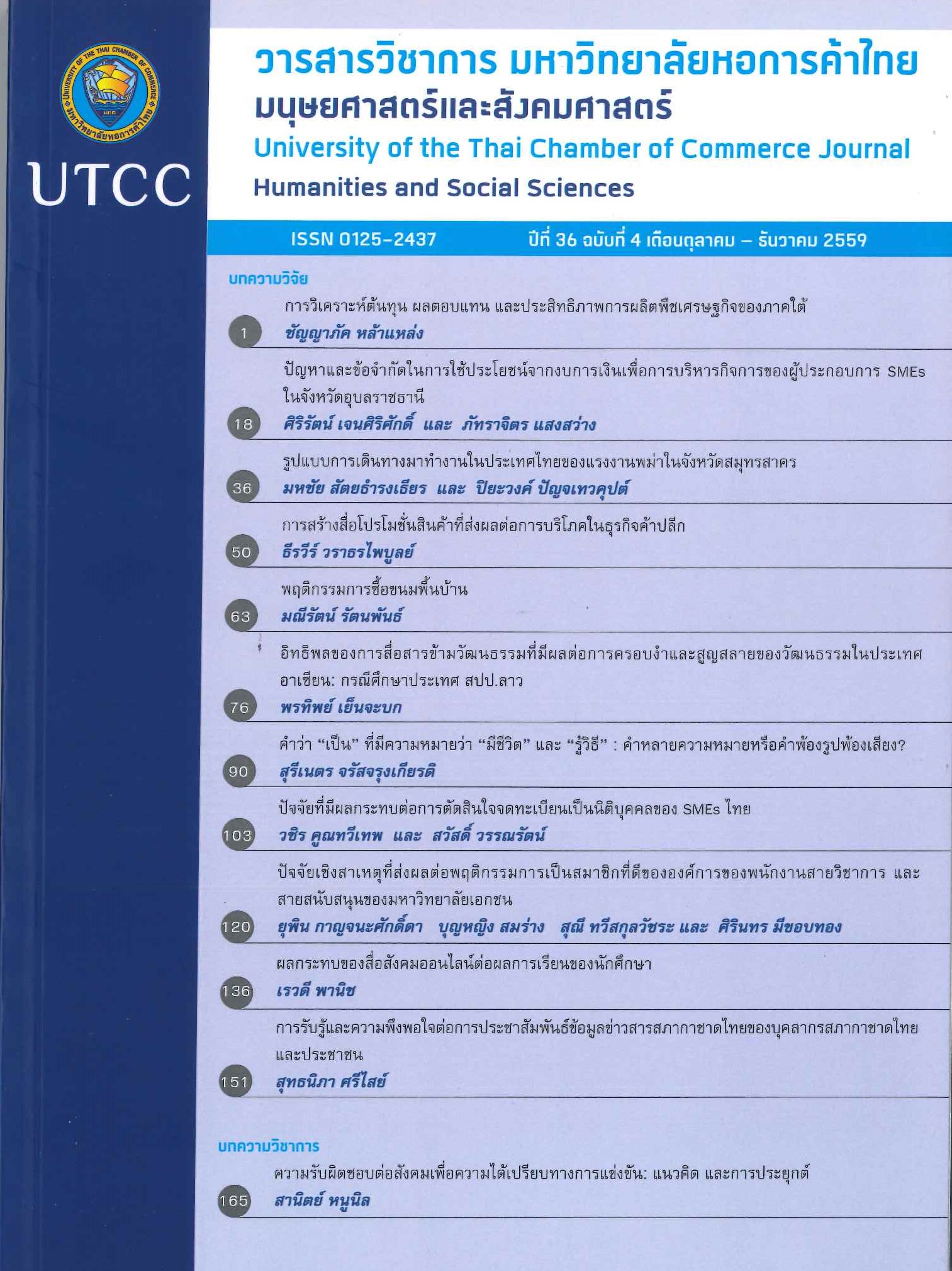The Effect of Cross-Cultural Communication on ASEAN Cultural Hegemony: A Case Study of Lao People’s Democratic Republic
Main Article Content
Abstract
This research is designed to study the effect of cross-culture communication on ASEAN cultural hegemony, cultural changes in ASEAN countries dominated by cross-culture communication from outside ASEAN, the influence of cross-culture communication to ASEAN cultural hegemony, and factors conductive to ASEAN cultural hegemony. The content analysis of television and Cable TV has aired in Thailand and Lao PDR. New media such as YouTube, Face book and Twitter in-depth interviews
with 25 peoples including observation, and focus group discussions with another group of 34 people in the Lao PDR were conducted. The study found that Thai and Lao citizens share the same attributes in terms of population features and media exposure behaviors. Particularly, Laos binds up with religion and incorporates the belief from Theravada Buddhism into his culture and way of living. As a result, Laos has strictly stood for its good customs. Obviously, most of Laos prefer to expose
Thai television programs rather than Laos programs. Thai media and capitalism had a substantial impact on Laos’ people way of living. Simultaneously, Thais face the effect of cross-cultural communication clearly and it has some impacts on Thai people. The influence of South Korean cultural merchandises affects the way of living in Thai society. With regards to Korean cultural domination, Thai culture have a risk of losing. However, Laos partially receives Korean culture since Laos still maintains its original culture. The high level of behavioral change in Thailand is due to frequent Korean media exposure. On the other hand, there are a few changes for Laos
teenagers because of partial Korean cultural intimation through Thai media.
Article Details
ลิขสิทธิ์ของบทความ
ผลงานที่ได้รับการตีพิมพ์ถือเป็นลิขสิทธิ์ของมหาวิทยาลัยหอการค้าไทย ห้ามมิให้นำเนื้อหา ทัศนะ หรือข้อคิดเห็นใด ๆ ของผลงานไปทำซ้ำ ดัดแปลง หรือเผยแพร่ ไม่ว่าทั้งหมดหรือบางส่วนโดยไม่ได้รับอนุญาตเป็นลายลักษณ์อักษรจากมหาวิทยาลัยหอการค้าไทยก่อน
References
เจษฎา ไชยพงษ์. 2552. “สังคมไทยกับกระแสวัฒนธรรมข้ามชาติ.” สารศูนย์เฝ้าระวังทางวัฒนธรรม 7, 3: 29-31.
Chokriensukchai, K. 2014. “Myanmar’s Travel Behavior, Media Exposure and Perception on Thai Cultural Universals.” University of the Thai Chamber of Commerce Journal 34, 4: 92-108. (in Thai).
กาญจนา โชคเหรียญสุขชัย. 2557. “พฤติกรรมการท่องเที่ยว การเปิดรับสื่อและการรับรู้วัฒนธรรมไทยที่เป็นสากลของชาวเมียนม่า.” วารสารวิชาการ มหาวิทยาลัยหอการค้าไทย 34, 4: 92-108.
Kaewthep, K. 2001. Science of Media and Cultural Studies. Bangkok: Edison Press Products. (in Thai).
กาญจนา แก้วเทพ. 2544. ศาสตร์แห่งสื่อและวัฒนธรรมศึกษา. กรุงเทพมหานคร: เอดิสันเพรสโปรดักส์.
Korean Culture and Information Service. 2011. Contemporary Korea No.1 The Korean Wave: A New Pop Culture Phenomenon. Sejong: Korean Culture and Information Service.
Lertrukmongkol, A. 2011. “Entertainment Marketing: Marketing of the Digital Entertainment Business.” In C. Virad. (ed.), iMarketing 10.0 10 Online Marketing Strategies Shake the World, pp. 390-439. Bangkok: Provision. (in Thai).
อาทิตย์ เลิศรักษ์มงคล. 2554. “Entertainment Marketing การทำการตลาดธุรกิจบันเทิงยุคดิจิตอล.” ใน วิลาศ ฉ่ำเลิศวัฒน์ (บรรณาธิการ), iMarketing 10.0 10 กลยุทธ์การตลาดออนไลน์เขย่าโลก, หน้า 390-439. กรุงเทพมหานคร: โปรวิชั่น.
Sathayanuruk, A. 2011. The "Media" across Cultures [Online]. Available: https://www.bangkokbiznews.com/home/detail/politics/opinion/attachak/20110819/40 5477/The-media- across-cultures.html (in Thai).
อรรถจักร์ สัตยานุรักษ์. 2554. การศึกษา “สื่อ” ข้ามวัฒนธรรม [ออนไลน์]. เข้าถึงจาก:
https://www.bangkokbiznews.com/home/detail/politics/opinion/attachak/20110819/40 5477/การศึกษา-สื่อ--ข้ามวัฒนธรรม.html
Sington, S. 2009. “Teen Thailand 's Social Learning Modern Music Culture of South Korea.” Doctoral dissertation, Thammasat University. (in Thai).
ศรัณย์ สิงห์ทน. 2552. “การเรียนรู้ทางสังคมของวัยรุ่นไทยจากวัฒนธรรมเพลงสมัยใหม่ของประเทศเกาหลีใต้.” วิทยานิพนธ์ปริญญาดุษฎีบัณฑิต มหาวิทยาลัยธรรมศาสตร์.
Sukshu, S. 2006. “Hallyu: Korean Wave of Prosperity.” Positioning 21: 60-61. (in Thai).
สุภัทรา สุขชู. 2549. “Hallyu: คลื่นความมั่งคั่งของเกาหลี.” Positioning 21: 60-61.
Thailand. Department of Asean Affairs. 2011. ASEAN Highlights 2011: 7 Social Phenomena Network ASEAN. Bangkok: Page Maker. (in Thai).
กรมอาเซียน. 2554. ASEAN Highlights 2011: 7 ปรากฏการณ์ Social Network อาเซียน. กรุงเทพมหานคร: เพจเมคเกอร์.


